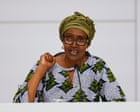
In a rapidly changing world, the interconnectedness of health and safety across global communities demands thoughtful attention. Recent developments shed light on significant issues ranging from funding cuts in health programs to child safety and vaccine policy concerns. This article highlights these pressing matters while encouraging a calm reflection on their broader impacts.
First, let us consider the implications of international aid alterations. The decision to curtail funding for crucial health initiatives can have far-reaching effects. Winnie Byanyima, the Executive Director of UNAids, has voiced profound concerns over the potential repercussions of seismic funding reductions in the fight against HIV and AIDS. These cutbacks, notably from the U.S. President’s Emergency Plan for AIDS Relief (Pepfar), threaten to undermine years of progress, with projections indicating millions could face increased health challenges without sustained financial support. Such funding is vital for prevention, care, and treatment programs worldwide, making its potential loss a significant global health concern.
Turning to another corner of the globe, the landscape of childcare services confronts its own urgent challenges. Socially responsible investment funds have raised questions following allegations of abuse within childcare facilities operated by G8 Education. These concerns underscore the necessity of rigorous staff screening and robust child safety protocols. The case of Joshua Dale Brown, charged with a multitude of offenses across multiple centers, serves as a stark reminder of the importance of stringent safeguarding measures. This situation calls for an increased focus on accountability and transparency within childcare operations to ensure the well-being of the most vulnerable in society.
In parallel, we navigate the ongoing complexities of providing humanitarian aid under challenging circumstances. In Gaza, a potential humanitarian crisis looms, exacerbated by severe restrictions on essential goods. Doctors in the region have issued warnings about a worsening shortage of infant formula, a critical nutrient source for babies. With limited access to dietary necessities, healthcare providers face daunting hurdles in caring for newborns and premature infants, highlighting the urgent need for a collaborative international effort to facilitate humanitarian relief.
Moreover, current developments in vaccine advisory roles reveal the critical balance between scientific consensus and personal beliefs. The appointment of vaccine skeptics, including Vicky Pebsworth, to influential positions within the Centers for Disease Control and Prevention’s (CDC) Advisory Committee on Immunization Practices raises significant discourse. It is a poignant reminder of the importance of grounding health policies in robust scientific evidence. As the global community continues to navigate vaccination hesitancy, ensuring that decisions are informed by rigorous research is paramount to maintaining public trust and health.
In conclusion, these stories reflect the multifaceted nature of global health and safety challenges. From addressing funding gaps in health programs to ensuring the protection and well-being of children, and maintaining evidence-based public health guidance, there is a pressing need for collaborative, informed, and compassionate action. As we consider these issues, let us approach them with an understanding of their complexities and a commitment to fostering a healthier, safer world for all.
Source: {link}
